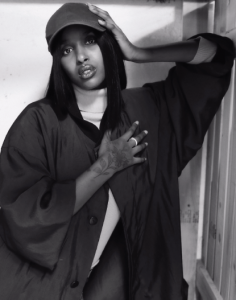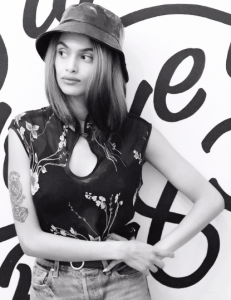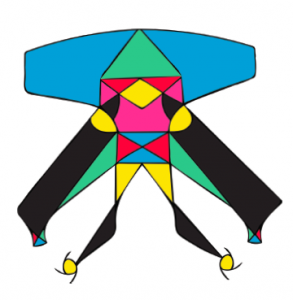Black womxn are the salt of the earth. They break open their rib cages and remove needed organs so that we can find home within. Black womxn fight. For us. With us. In spite of us.
NuZi Collective’s co-founders Samira Warsame and Betty Mulat embody this philosophy completely. I had the privilege of sitting with them. To get to know a little about them, together, as well as their upcoming New Forms Showcase. To be honest, I highkey ship the hell out of these two! These folks have created a dynamic that many marriages fail to achieve. A brave tenderness oscillates between them that you can’t help but smile sheepishly. “We are both passionate, intelligent, strong women.” That’s ZamZam, given names Samira Warsame. “We went through some deep shit. Personally, and together. We really just clicked. You know when that happens? It just happened.” Their back and forth flows, conversationally translating well, into a delicious give-and-take in underground spaces.
 ZamZam, a natural storyteller whose bright eyes, ease of conversation and passionate, poetic flow, have you continuously leaning in as she speaks. She is a slim, thoughtful, woman with a sleek natural hairstyle, soft yet striking features, and long lashes that make her liquid amber eyes sparkle. She is of strong Somali heritage, having grown up in a multicultural neighborhood in Whalley, Surrey most of her life.“I was really uplifted when I was younger… I grew up with my family and we were a unit. My grandparents, my uncles, my sibling, my mom, and my aunt. We were all in a house together […] Then, my mum got remarried to a white man, and my life changed drastically after that. We moved to a white neighbourhood in White Rock. And I noticed how my assimilation process was constant. It was at school. It was at home. I was aware of what was going on but I did not have the language. I could see it happening to my mum, see it happening to me, and see how my sibling who is half white, was treated differently than me, [I could] see how the way that I spoke, the way that I dressed, the way that people spoke to me, was so different from what it used to be…I was the only black girl in my school. In Surrey there were East Asians, Nigerians, Somalis, it was so diverse, I never felt bothered. But when I moved to that white neighbourhood, and I was in my teens, I was very hyper aware of it [my blackness].”
ZamZam, a natural storyteller whose bright eyes, ease of conversation and passionate, poetic flow, have you continuously leaning in as she speaks. She is a slim, thoughtful, woman with a sleek natural hairstyle, soft yet striking features, and long lashes that make her liquid amber eyes sparkle. She is of strong Somali heritage, having grown up in a multicultural neighborhood in Whalley, Surrey most of her life.“I was really uplifted when I was younger… I grew up with my family and we were a unit. My grandparents, my uncles, my sibling, my mom, and my aunt. We were all in a house together […] Then, my mum got remarried to a white man, and my life changed drastically after that. We moved to a white neighbourhood in White Rock. And I noticed how my assimilation process was constant. It was at school. It was at home. I was aware of what was going on but I did not have the language. I could see it happening to my mum, see it happening to me, and see how my sibling who is half white, was treated differently than me, [I could] see how the way that I spoke, the way that I dressed, the way that people spoke to me, was so different from what it used to be…I was the only black girl in my school. In Surrey there were East Asians, Nigerians, Somalis, it was so diverse, I never felt bothered. But when I moved to that white neighbourhood, and I was in my teens, I was very hyper aware of it [my blackness].”
 Betty Mulat, artistically known as Venetta, with her wide, striking eyes, teeny weeny afro, golden skin, and smokey bourbon voice you’ll recognize captivating audiences during her techno/house sets at parties throughout the city. Wearing a ‘90s ski jacket and high waisted jeans, she exudes an elegant charm that lightens your spirit. She leans back in her chair and her voice softens as she adds somberly, “…dealing with hella racism growing up, being one of the only open Black girls in my school, I never thought the day would come where I thought things would change, so I wouldn’t think about political issues and stuff; for the sake of preserving my own safety and sanity, because I didn’t think things [c]ould change, especially so rapidly; you grow up and realize the only way forward is to unlearn what you’ve been indoctrinated with, to do your own shit and also seeing all these boss Black people, running shit. I wish I knew then what I know now. Growing up I tried to be anything but Black, but I realize it’s the biggest blessing in the world. Like, there was a time I didn’t want to be like this. There was a time where I tried to not look like this. When I look at old pics I think [to myself] ‘I feel for you and what you were going through.’ And I think about the young Black girls now who are surrounded by people who aren’t quite there yet in seeing who they are, and I can’t help but feel for them; but [I] never judge […] some people judge […] people are going at their own pace and we have to meet them where they’re at in their inner growth journey.” Venetta grew up an only child, to a single Ethiopian immigrant mother in Burnaby, BC. She attended a fairly diverse school however attributes the many experiences of the normalization of the institutionalized violence and discrimination to what drives the work the Collective does today. ” I feel as if it is actually a privilege to bear the responsibility of starting this [Collective] and doing this work,” she beams.
Betty Mulat, artistically known as Venetta, with her wide, striking eyes, teeny weeny afro, golden skin, and smokey bourbon voice you’ll recognize captivating audiences during her techno/house sets at parties throughout the city. Wearing a ‘90s ski jacket and high waisted jeans, she exudes an elegant charm that lightens your spirit. She leans back in her chair and her voice softens as she adds somberly, “…dealing with hella racism growing up, being one of the only open Black girls in my school, I never thought the day would come where I thought things would change, so I wouldn’t think about political issues and stuff; for the sake of preserving my own safety and sanity, because I didn’t think things [c]ould change, especially so rapidly; you grow up and realize the only way forward is to unlearn what you’ve been indoctrinated with, to do your own shit and also seeing all these boss Black people, running shit. I wish I knew then what I know now. Growing up I tried to be anything but Black, but I realize it’s the biggest blessing in the world. Like, there was a time I didn’t want to be like this. There was a time where I tried to not look like this. When I look at old pics I think [to myself] ‘I feel for you and what you were going through.’ And I think about the young Black girls now who are surrounded by people who aren’t quite there yet in seeing who they are, and I can’t help but feel for them; but [I] never judge […] some people judge […] people are going at their own pace and we have to meet them where they’re at in their inner growth journey.” Venetta grew up an only child, to a single Ethiopian immigrant mother in Burnaby, BC. She attended a fairly diverse school however attributes the many experiences of the normalization of the institutionalized violence and discrimination to what drives the work the Collective does today. ” I feel as if it is actually a privilege to bear the responsibility of starting this [Collective] and doing this work,” she beams.
The women met in 2015 at an after hours party. They clicked instantly and spent the next 24 hours together talking about pretty much everything you could imagine. There’s something magical that happens when you get more than one Black person in a room together. “We just talked about our dreams and our intentions, and what we want to see in our community in the city,” recalls ZamZam, “and why it’s hard for Black folks to come together. And ever since then we’ve been inseparable professionally; a sisterhood was formed and we were just on a path. Back then you could see all this talent trying hard to find space […] and not feeling like there was enough space and feeling kind of defeated and depleted […] We could see both sides and we decided to accumulate our talents and knowledge [and] we’re like, alright this is happening. This is the future, this is our generation, and it’s what we need to survive in the city. We are not going to be pushed out or silenced or ostracized or feel like we don’t belong. We were both raised here, why the fuck do we feel we don’t belong here? Y’know?”
 Belonging. That is an action, isn’t it? We are always actively doing the work to make space for ourselves to feel like we belong, right? NuZi Collective does that for the community. And in a pretty grassroots way too, often using their own personal funds to book artists for shows they’ve produced. The showcase at New Forms Festival has a line up boasting names like Afrodeustche, bearcat, Prado, House of Kenzo and more. “All black artists. Strictly black and gay!” squeals ZamZam. New Forms Festival connects artists locally and all over the world. To have an opportunity to showcase your work, skills, talent, or art on this platform, as a local artist, is a huge deal as it provides you with a broader audience. The importance of having community spaces to gather that are safe for Black and Indigenous and brown, queer and trans and non-binary and genderfluid and genderless and all of us, is not lost. Especially now, especially against the backdrop of gentrification in our cities, climate change in our world — and the greater picture of the crime of colonization on the lands we all currently inhabit. It’s important that our spaces are given back to the peoples who matter. “It’s easier to feel safe holding back than it is to express yourself,” surmises Venetta, “but finding the right spaces, where blackness and freedom are embraced, is what we need to continue pushing for […] The mission was to create a space for us, and now the mission is to protect that space as hard as we can. No ones coming in to disrupt that.”
Belonging. That is an action, isn’t it? We are always actively doing the work to make space for ourselves to feel like we belong, right? NuZi Collective does that for the community. And in a pretty grassroots way too, often using their own personal funds to book artists for shows they’ve produced. The showcase at New Forms Festival has a line up boasting names like Afrodeustche, bearcat, Prado, House of Kenzo and more. “All black artists. Strictly black and gay!” squeals ZamZam. New Forms Festival connects artists locally and all over the world. To have an opportunity to showcase your work, skills, talent, or art on this platform, as a local artist, is a huge deal as it provides you with a broader audience. The importance of having community spaces to gather that are safe for Black and Indigenous and brown, queer and trans and non-binary and genderfluid and genderless and all of us, is not lost. Especially now, especially against the backdrop of gentrification in our cities, climate change in our world — and the greater picture of the crime of colonization on the lands we all currently inhabit. It’s important that our spaces are given back to the peoples who matter. “It’s easier to feel safe holding back than it is to express yourself,” surmises Venetta, “but finding the right spaces, where blackness and freedom are embraced, is what we need to continue pushing for […] The mission was to create a space for us, and now the mission is to protect that space as hard as we can. No ones coming in to disrupt that.”


